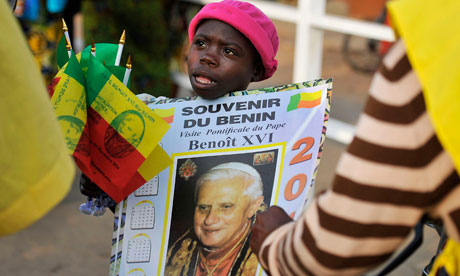
When Pope Benedict XVI raised the issue of Aids prevention on his trip to Benin, he told a small part of the story. He said, correctly, that dealing with the disease is an ethical problem. He went on to call for people to change their sexual behaviour, promoting abstinence. But there are several other things that the pope could have said that would help save lives.
There are indeed many ethical issues involved in Aids and preventing the spread of HIV. I would like to see the institutional church address some of them, such as the Catholic hierarchy's continued campaign to deny condoms to those seeking to prevent the spread of HIV, especially in the many treatment centres that the church runs around the world. This is especially important for couples when one person is positive and seeks to prevent transmitting the disease to his or her partner. The church hierarchy does not permit condom use, even for these "discordant" couples.
In addition, Pope Benedict leads a church that receives hundreds of millions of dollars every year for HIV and Aids treatment and prevention. Leaders in the church seek to deny the thousands of workers in Catholic institutions around the world the right to distribute condoms that would save lives. This is intolerable. Some bishops continue to lie about the effectiveness of condoms in saving lives. While condoms are not a panacea, they are very effective in preventing the transmission of HIV and should be provided to those who can benefit from their use.
The last two times the pope discussed preventing HIV, he caused enormous controversy. In March 2009, on a previous trip to Africa, he acknowledged the HIV crisis, but claimed that condoms aggravated the problem. In fact, he said, condom use "increases the problem". The pope quickly found that few Catholics and even fewer medical professionals agreed with his stance. Several bishops in Africa, especially Bishop Kevin Dowling of Rustenburg in South Africa, have been outspoken in their support of the use of condoms. Anecdotal evidence also suggests that many people who work with Catholic relief agencies distribute condoms to those at risk of infection.
For the Catholic hierarchy to deny the role that condoms play in preventing the further spread of HIV is irresponsible and dangerous. Not only that, the Catholic hierarchy has lobbied governments in the global north against the inclusion of funding for condoms in development aid programs. The result is to deny the poorest of the poor in the global south the chance of protecting themselves by using condoms.
In 2010, the pope said that condom use to prevent the transmission of HIV is "a first step in a movement toward a different way, a more humane sexuality". This admission is the Catholic hierarchy's own first step in addressing the realities about sex and sexuality. However, while this was a game-changing statement, there is still a long way to go before the Vatican's teachings on condoms meet the needs of Catholics around the world – for contraception as well as for HIV and Aids prevention.
In 2009, the pope was wrong. In 2010, he displayed a more mature understanding of the problem. In 2011, he should have gone much further. According to a 2007 poll in which Catholics living in Ghana, Ireland, Mexico, the Philippines and the United States were interviewed about their views, support for condom use is overwhelming. When asked if "using condoms is prolife because it helps save lives by preventing the spread of Aids", 90% of Catholics in Mexico, 86%in Ireland, 79% in the US, 77% in the Philippines and 59% in Ghana agreed.
In 2001, Catholics for Choice initiated the Condoms4Life campaign, an unprecedented worldwide public education effort to raise public awareness about the devastating effect of the bishops' ban on condoms. The campaign's slogan is "Good Catholics use condoms". The day the pope states that, without equivocation or qualification, will be an enormously important day in the ongoing global struggle against the spread of HIV and Aids.
• This article was commissioned following a suggestion made by StevHep. If there's a subject you'd like to see covered on Comment is free, please visit our You tell us page

